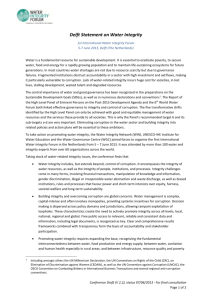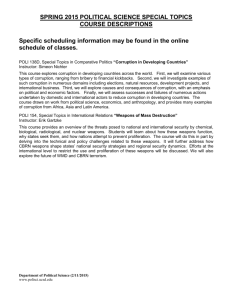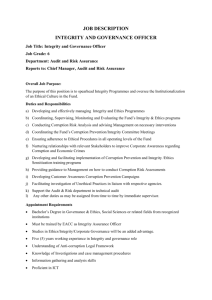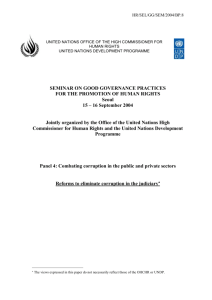DOC - Supreme Court
advertisement
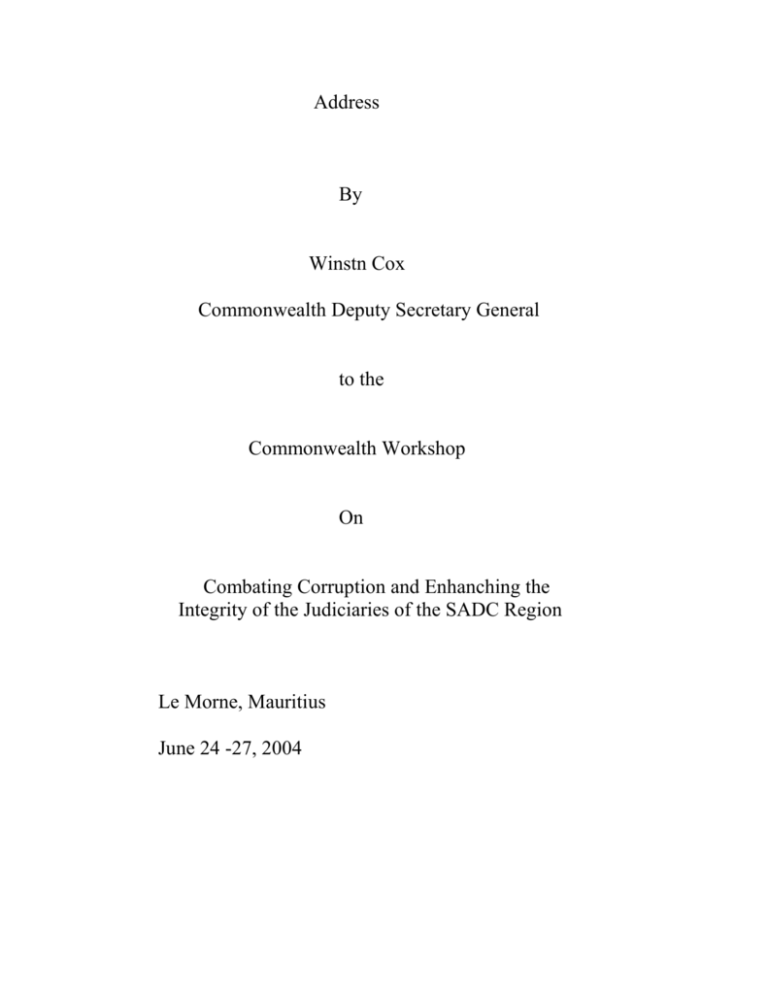
Address By Winstn Cox Commonwealth Deputy Secretary General to the Commonwealth Workshop On Combating Corruption and Enhanching the Integrity of the Judiciaries of the SADC Region Le Morne, Mauritius June 24 -27, 2004 Ladies and gentlemen corruption is an unjust, cruel and burdensome tax that falls upon the backs of the poor, the politically disenfranchised and those groups excluded from society. Corruption limits the capacity of a society to combine social justice with economic efficiency, and it limits the capacity of society to achieve the just and fair distribution of the benefits of growth that we all work so hard to achieve. Indeed, not only will justice in the distribution of economic gains be absent, but the very economic efficiency that generated those gains and laid the foundations of prosperity will itself also be eventually eroded by corruption. In the body politic or in the body corporate corruption is like a cancer that must be treated with radical surgery. But however much we treat it we can never be satisfied that it has been eradicated. It is not a disease that is limited to the poor countries: it affects the rich countries as well and both rich and poor must join together to fight against it. Neither in rich countries nor in poor countries can citizens afford to ignore the destruction of wealth caused by corruption. The losses from the collapse of Enron and World Com far exceed the combined GDP of several Commonwealth developing countries. Corruption and its attendant consequences are not compatible with the fundamental political values of the Commonwealth, namely the promotion of democracy and inclusiveness, the rule of law, independence of the judiciary and good governance. Nor is the existence of corruption consistent with fiscal 2 transparency and the commitment to the reduction of poverty, which we have all agreed is the overarching priority in the millennium development goals (MDGs). While the industrial economies may be able to recover from some of the more spectacular examples of corruption, the same is not the case in the developing world. Capital flight, the reversal of social and economic advances, the destruction of investor confidence and the loss of investment opportunities are not easy to overcome in the developing world. That is why for many years now we in the Commonwealth Secretariat, at the request of the heads of our governments, have had the fight against corruption so high on the agenda of our work with our developing member countries. In 1997, the Secretary General, responding to the mandate from the Heads of Government, brought together an expert group to study the root causes and the effects of corruption on Commonwealth countries and to recommend possible national and international action to combat it. Their findings, published in ‘The Commonwealth Expert Group Report on the Elimination of Corruption in Economic Development’ also included a set of principles to guide countries in the fight against corruption. These recommendations, known as ‘The Framework for Commonwealth Principles on Promoting Good Governance and Combating Corruption’, The Framework of Principles in Secretariat shorthand, were accepted by the Heads of Government when they met in Durban in 1999. At that meeting Commonwealth Governments committed themselves to zero tolerance of corruption. 3 If the policy of zero tolerance is to succeed it must permeate the entire society. From the highest to the lowest, from the richest to the poorest, every one must be committed to zero tolerance of corruption. It must permeate the entire political culture of the society and all the institutions of governance, including the legal and administrative systems. In respect of the Judiciary The Framework of Principles underscored the importance of impartiality and independence of judges and other officials of the courts in the fight against corruption. The Expert Group recognized that judicial independence did not mean lack of accountability and they said that: “judges should act properly in accordance with their office and should be subject to ordinary criminal laws of the land. There should be procedures to discipline them if they act improperly or otherwise fail in the performance of their duties to society. These procedures should be transparent and administered by institutions which are themselves independent and impartial”. Law Ministers recognized, however, that action to ensure judicial accountability had to be taken in such a way that it could not be mistaken for interference with judicial independence. They asked the Secretariat to help them address this problem and a Judicial Colloquium in Limassol, Cyprus in June 2002 led to the Limassol Conclusions. At that conference the participants recognized that “a judiciary free from corruption was an essential component of a truly democratic country and is crucial to national development and the eradication of 4 poverty”… and a court system free from corruption was “one of the essential features of a country able to attract investment and thus develop in a way that would embrace the welfare of its people”. While the Limassol Colloquium did not produce one, the participants also agreed on the importance of a code of conduct for the guidance of judicial officers in the discharge of their duties. They also agreed on the importance of continuing education for officers of the judiciary, and endorsed the growing practice of mentoring for newly appointed officials and the international exchange of best practice. At the Commonwealth Secretariat we have put up a programme in place to implement the recommendations of the Limassol Colloquium. The actions we have taken include: Continuing programmes of training on ethics and integrity for the judiciary, including administrative staff; Development of tool kits for judges, lawyers and court staff on gender and human right issues; Surveys of access to justice in the Commonwealth; Development of training manuals for the judiciary and legal profession on alternative dispute resolution (ADR) mechanisms; Workshops and training seminars for judges, lawyers and lay mediators; Development and review of Bench Books; and The review of Codes of Conduct for judicial officers and other court staff. 5 In the Caribbean, we have worked with the Judicial Education Institute of the Eastern Carribean Court and the Commonwealth Magistrates and Judges Association to improve the operations of the courts so as to reduce and eliminate corruption. At their request we have conducted similar programmes for the Zambian and the Zanzibari Judiciary; and we have prepared model legislation against corruption for use by Commonwealth countries. Last week, in keeping with the request of the Heads of Government when they met in Abuja last December, we have started work on the vexed issue of asset repatriation by convening the first meeting of the Commonwealth Working Group an Assets Repatriation. All these activities and all this training cannot be a substitute for personal integrity; they can reinforce and bolster, they can provide the principles that help to stiffen resolve it, but they cannot replace personal integrity. Members of the judiciary, by their own conduct and by their personal behaviour are their own best advocates in defense of the independence and incorruptibility of the bench. The courts are often the last line of defense against corruption in the public and private sector and as you well know, in the case of court officials themselves, the question is not whether these officials are or are not corrupt; the question is what is the public perception. Judges and other officials of the court must not only be persons of the highest integrity, but like Caesar’s wife, they must be above suspicion if they are to retain the confidence of the society they serve. 6 But just as corruption is an unfair burden upon the backs of the poor, so too would it be unfair to place the burden of the fight against corruption on the shoulders of the judiciary alone. We have therefore extended the fight against corruption through our efforts to promote good corporate governance and a code of conduct for multinational corporations, through our programmes against money laundering and the financing of terrorism, and through a programme to promote greater transparency and accountability in public expenditure. We hope through these combined efforts to build a constituency of informed citizens in every Commonwealth developing country that is committed to zero tolerance of corruption. By promoting good corporate governance and supporting a code of conduct for multinational corporations we hope to attack the supply side of corruption. We have found that the principles, practices and techniques of good corporate governance can also be used by oversight agencies such as parliamentary committees that review public accounts and have often included parliamentarians in some of our training programmes on corporate governance. Through our efforts to prevent money laundering we seek to deny benefits to those engaged in corrupt practices and these efforts will be strengthened by the recently launched programme on asset repatriation. Through the promotion of greater transparency and accountability in public finance we hope to aim citizens with the tools and the information to satisfy themselves that public spending reaches the intended beneficiaries and is not diverted to line the pockets of a corrupt clique. Together these programmes, if successful, should prevent corruption and thus reduce the burden on the court system. 7 In all our work we are very grateful to our partners for their contributions and their cooperation. In this Workshop I would especially like to thank the Commonwealth Magistrates and Judges Association and the United Nations Office for Drugs and Crime for their cooperation. I understand that you, through Dr. Zvekic were a strong supporter of this event and will be an active participant as well. For that we are very grateful to you and to UNODC. I also wish to acknowledge the contributions by such eminent persons as Prof. William Binchy, Justice Ibitola Sotuminu, and Mr Joe Raulinga to our deliberations. And I thank my colleagues, Ms Wright and Ms Chan, for the work that they have done in organizing this valuable and important workshop. I look forward to receiving your report and recommendations for further action in the fight against corruption. Thank you. 8



